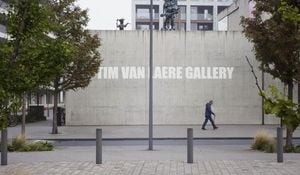In a world where many Indigenous languages teeter on the brink of extinction, innovative efforts from across the globe are breathing new life into these vital cultural treasures. From Tokyo to Canada and Australia, communities and educators are pioneering fresh approaches to language preservation, harnessing technology, immersion education, and international collaboration to ensure their mother tongues survive and thrive.
On July 26, 2025, an online training course for Vietnamese language teachers working abroad launched in Tokyo, drawing over 500 delegates from around the world. Hosted by the Vietnamese Consulate General in Fukuoka, alongside the Vietnamese Association in Japan and the State Committee for Overseas Vietnamese (SCOV) under the Ministry of Foreign Affairs, the program aims to equip educators with effective, accessible methods and materials to pass on the Vietnamese language and culture to younger generations living overseas.
Vietnamese Consul General in Fukuoka Vũ Chi Mai emphasized the noble yet challenging nature of the mission, underscoring the need for dedication and belief in the mother tongue's value. Nguyễn Trung Kiên, chairman of SCOV, highlighted the significance of preserving cultural identity for the over six million overseas Vietnamese, calling it a sacred responsibility. Plans are underway for the Việt Nam Fatherland Front and diplomatic missions to hold conferences and seminars in 2026 to assess language preservation efforts and develop a national plan to promote cultural identity abroad.
Professor Dr Nguyễn Minh Thuyết, chief editor of the 2018 General Education Programme, outlined three key challenges in teaching Vietnamese overseas: limited tailored teaching materials, a shortage of trained teachers, and the informal nature of many classes. The training course, running over five Saturdays until September 20, 2025, focuses on helping teachers select or develop appropriate materials, apply effective methods, manage classrooms, and coordinate with families and communities to nurture both language and culture. Additional programs include advanced training on Vietnamese phonetics, script, vocabulary, grammar, and culture, ongoing consultation support, and experience-sharing sessions among educators worldwide.
Meanwhile, thousands of miles away in Canada, a different kind of innovation is underway to preserve the Michif language, an endangered tongue spoken by the Métis people. According to a 2021 study by Statistics Canada, only around 1,800 Michif speakers remain worldwide, with experts warning the number of fluent speakers may now be fewer than 1,000. Enter Josh Nilson, a Métis video game developer and founder of East Side Games, who is leveraging the global popularity of the Roblox platform to create Michif RP, a language-learning game designed to engage youth and adults alike.
Roblox, boasting over 202 million monthly users, provides a user-generated content platform where players can build and explore unique game worlds. Nilson’s Michif RP currently focuses on the Northern Michif dialect, which has fewer than 200 speakers and is notoriously difficult for newcomers. The game immerses players in language learning through interactive activities such as horse riding, earning badges, and completing quests, all guided by Amelia Douglas, a Métis matriarch character. The first phase includes three to four hours of content, with plans to expand storytelling and interactivity in future phases. Nilson envisions the game becoming a widespread educational tool, potentially used in museums across British Columbia and beyond to teach Indigenous languages and culture.
“When you take away someone’s language, that’s how you colonize them,” Nilson explained. “So we’re trying to take that back. Traditional language apps and books aren’t always engaging, and you might not retain what you learn. But kids learn by playing.” This project is deeply personal for Nilson and represents a reconnection with a cultural identity often inaccessible to his generation.
Half a world away in Australia, the Salish School of Spokane has garnered international recognition for its effective methods in teaching endangered Indigenous languages. Known for its fluency transfer system and immersion education, the school caught the attention of the Pertame people of Australia after a 2022 summer immersion symposium in Montana. Six members of the Pertame community attended the training and enthusiastically translated the Salish School's first language book into their own language even before their plane touched down in Australia.
With funding from First Languages Australia, the Salish School was invited to lead a three-day training in June 2025 for 48 Aboriginal Australian and Torres Strait Islander groups in Alice Springs. The team included school co-founder LaRae Wiley, Principal Christopher Parkin, their son Grahm Wiley-Camacho and his wife Dominique, both lead elementary teachers, and their two daughters. The training combined community input with immersive language teaching sessions, where participants learned through full immersion rather than traditional academic instruction.
Parkin described the fluency transfer system as focused on creating new fluent community members who can communicate and live in the language daily, rather than merely studying linguistic mechanics. “We don’t learn about the language, we learn the language,” he said. This approach includes language and storybooks at four levels, with traditional stories—čaptíkʷɬ—forming the cultural foundation, akin to a constitution or Shakespeare for the Salish people.
One of the most moving moments of the training was when Grahm spoke in Salish for half an hour, with his seventh-grade daughter Seneca translating, demonstrating a rare three-generation fluent family. The Pertame people also showcased their immersion teaching using their own Level One language book, signaling a promising future for Indigenous language revitalization in Australia.
These diverse initiatives—from virtual classrooms in Tokyo, digital playgrounds in Canada, to immersive training in Australia—illustrate how Indigenous communities worldwide are creatively tackling the urgent challenge of language loss. By combining tradition with technology and international collaboration, they are not only preserving languages but also strengthening cultural identity and community resilience for generations to come.




